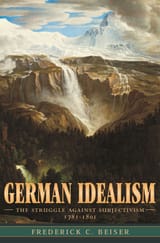Search Results
6/10/2025, 6:52:51 PM
"Hegel expropriated the past, exaggerating his own originality and individuality. What Hegel portrayed as his own characteristic doctrine, what he regarded as his unique achievement, was all too often said years before him. There is not a single Hegelian theme that cannot be traced back to his predecessors in Jena, to many earlier thinkers whom Hegel and the Hegelian school either belittled or ignored. The fathers of absolute idealism were Hölderlin, Schlegel, and Schelling - though the first would find no mention in Hegel's history, the second would be trivialized and dismissed, and the third treated as a mere footstool. So many ideas that are seen as uniquely Hegelian - the dialectic, immanent critique, the synthesis of Fichte and Spinoza, the absolute as the identity of identity and nonidentity, the importance of history within philosophy, self-positing spirit, alienation, the unity of community and individual liberty - were all commonplaces in Jena before Hegel came there in 1801.
To say this is not to belittle Hegel's achievement: in unsurpassed fashion he summarized and integrated into one system all the themes his less scholastic and organized contemporaries had left in fragments or notebooks. Nevertheless, to say this is to put Hegel in his proper historical perspective: he was not the creative and original thinker that his history suggests or that his disciples imply. Hegel's strength lay in his synthetic and systematic powers, in rationalizing and organizing the wealth of ideas created by his contemporaries.
In truth, Hegel was just as his friends in the Stift once portrayed him: der alte Mann, who ambled along on crutches. He was a tortoise among hares; and, when all the hares had squandered or consumed their energies he alone trudged, slowly but surely, over the finish line. Like all victors, he then rewrote history from his point of view, as the tale of his own triumph." - Frederick Beiser in picrel
tl;dr - yes.
To say this is not to belittle Hegel's achievement: in unsurpassed fashion he summarized and integrated into one system all the themes his less scholastic and organized contemporaries had left in fragments or notebooks. Nevertheless, to say this is to put Hegel in his proper historical perspective: he was not the creative and original thinker that his history suggests or that his disciples imply. Hegel's strength lay in his synthetic and systematic powers, in rationalizing and organizing the wealth of ideas created by his contemporaries.
In truth, Hegel was just as his friends in the Stift once portrayed him: der alte Mann, who ambled along on crutches. He was a tortoise among hares; and, when all the hares had squandered or consumed their energies he alone trudged, slowly but surely, over the finish line. Like all victors, he then rewrote history from his point of view, as the tale of his own triumph." - Frederick Beiser in picrel
tl;dr - yes.
Page 1
